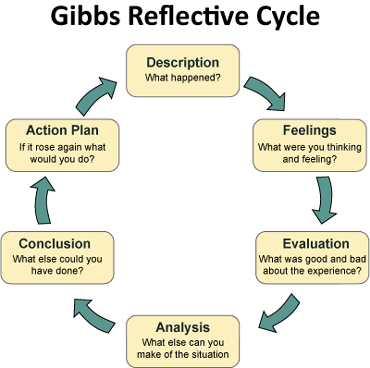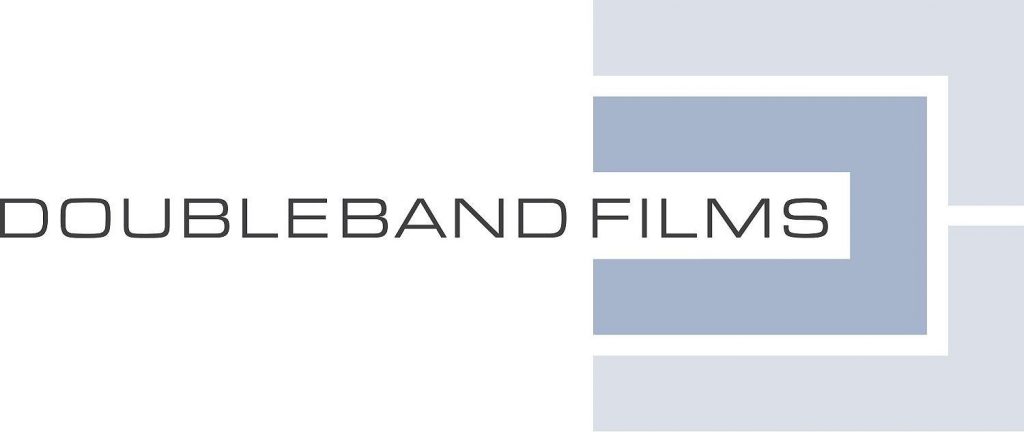Finding a job placement was a challenging task but proved to be very enlightening as to the reality of job searching within the film industry. Multiple CV drafts and countless rejections later I did manage to land an interview which led to a placement, but it was a long journey which upon reflection taught me a lot about the industry. I will use Gibb’s Reflective Cycle (1988) to reflect upon my experiences and analyse what they taught me. I have chosen to use the Reflective Cycle as Jasper states that it will allow me “to see the situation in a different way and to learn for the future”. (2013, 84)

Description
At the end of the last semester of second year, I found myself in need of a placement as I had signed up for the work placement module. I initially tried simply emailing production companies asking for work, but I heard little back so I decided to revamp my CV.
My CV was an old one I had used when I applied for my part time job, so I decided to start from scratch and make one that was purely orientated towards the film industry, discussing my relevant skills and listing any films on which I had worked, regardless of level of production. I tried to consider what things a production company would be looking for whenever I made the CV.
Unfortunately, at first the new CV did not seem to get any results, I still received little back from any production companies aside from one or two ‘we already have someone on placement’ replies. I emailed every possible production company or similar company I could find but when I didn’t hear back, I never followed up.
Once a month had gone by, I started emailing companies again, hoping for some sort of response or at least acknowledgement. This did help in getting responses, but they were still only rejection messages. At this point, I decided to ask my family members if they knew anyone in the industry who I could contact, through this I was able to get the email address of Michael Hewitt, managing director of DoubleBand Films. I emailed him and he asked me to come in for an interview so he could meet me in person.
I went to DoubleBand’s office and met Michael for an interview. It was a very laid-back interview in which I was asked about my future plans, my experience at Queens and my interest in films. It was a very simple interview and Michael was very relaxed about it but being in a new situation and scared that if I said the wrong thing, I wouldn’t be offered a placement, I was very nervous. I stuttered and I gave quick answers while completely blanking on a few occasions whenever asked even basic questions such as the type of films that interested me. Regardless of my nervousness, Michael seemed to think the interview went well as once we finished talking, he asked me about arrangements with Queens and then offered me a placement with DoubleBand as a research assistant.

Feelings
I will describe here how the experience made me feel as Jasper writes that at this stage you should “try to recall the things that were going on inside your head” (2013, 81). The constant rejections and lack of responses from most of the production companies was disappointing and left me feeling rather dejected. It didn’t bother me to begin with as I had put little effort into making a specialised CV and I felt that I had plenty of time to find something. Once I made a new CV orientated towards the film industry, I felt more confident that I would hear something back and I felt certain that I would have no issues finding a placement. However, as the weeks passed and I heard little aside from rejections, I started to lose hope and felt I was never going to land a placement. I had emailed every production company I could find in the local area, those that didn’t reply I messaged twice and still nothing, I began to feel unwanted, no one was interested in taking me on, even for unpaid work.
My lack of success led me to turn to my family members for help as I had been so unsuccessful trying to find something on my own. The fact that I was able to find something so much quicker through family connections left me with mixed feelings, I was of course happy to have found somebody willing to take me on but it also left me with feelings of contempt for the industry I wish to enter, I found myself questioning why it was near impossible to find a placement for myself but the second I was able to find a personal connection, I had no problem whatsoever. I had realised that even outside of Hollywood, the film industry was still mostly only accessible through nepotism. This left me with feelings of fear for the future as it would seem I will struggle to find any sort of employment without the help of nepotism.
The interview with DoubleBand had me feeling very stressed, this was my one chance to impress, or I’d risk losing out on a placement entirely. I was nervous throughout the interview and felt I had messed it up from the very start of the interview, however, all the stress and nervousness was lifted at the end of the interview when I was offered to take my placement with the company.
Evaluation
Overall, the experience went well as I did end up securing a placement. I’d say the successful aspects of the experience were making a new CV and managing to get an interview at DoubleBand. That said, there were still bad aspects of the experience. I’d say my initial failure to make a new CV is probably the worst aspect, also, my slowness to chase down those who hadn’t replied to my emails won’t have been helpful in finding an opportunity. Lastly, my interview while ultimately successful, won’t have reflected so well as I was nervous and stuttered over my words constantly.
Analysis
My experience for the most part was a negative one until close to the end, I faced rejections or just being straight-up ignored due to several factors. My choice to use an old generic CV when I first began searching did not go well as it will have come across as lazy and probably was not representative of my actual experience and skills within filmmaking. At the start, I was also slow to enquire a second time with companies I hadn’t heard back from, this meant if they had seen my email and forgotten about it, I was unlikely to get a response. However, the experience did take a turn towards the end as I made a new CV and began to be pushier towards companies in the hope of a reply, this garnered more responses but ultimately, still nothing useful. So, I finally asked a family member for help, and this was a good thing as it led to a connection at DoubleBand. While the interview didn’t go great, I still managed to get a placement with them, which ended the experience of searching positively.
Conclusion
In hindsight, there are multiple things I should have done differently from the beginning, the main issues though were my lack of determination and my old CV. If I found myself in a similar situation, I would have made a new CV to start with and I would also have been more pressing towards the production companies, pestering them until I got some sort of reply. In addition to this, I would have tried to approach the interview with a more laidback approach. Of course, I would treat it seriously and with importance, but I would try my best not to be nervous so that I wouldn’t appear unsure of myself and end up blanking and stuttering through the interview.
Action Plan
It is rather clear to me now that there are various things I should have done differently while searching for a placement. So, if I were to find myself in such a situation again, these are the key things that I would do differently to ensure a better outcome. Firstly, I would ensure that my CV was up to date and relevant to the type of positions I was applying for to ensure that it sticks with production companies rather than having a muddled mess that doesn’t accurately represent me, my skills and my experience.
Next, I would take on a more committed approach towards the search, I would email more production companies and more frequently to ensure that I was giving myself as many opportunities as possible. This way, I’m more likely to garner responses as the more times I contact a company, the more determined I seem, and the more they’re likely to remember me.
Finally, the last key thing I would do differently is to just be more confident in myself and my knowledge, I allowed my lack of confidence and doubt in my own knowledge to make myself nervous for my interview with the production company, and this would reflect poorly on me as I seem unsure of myself and potentially an undesirable candidate for the position.
Bibliography:
Jasper, M. (2013) Beginning Reflective Practice. Melbourne & London: Cengage Learning.